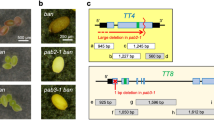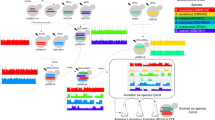Abstract
EVER since the discovery of the effect of ionizing radiations on genetic material it has often been questioned whether any mutations of value to the breeder could be produced by such means. This is because there is general agreement among geneticists that individuals with rare mutant genes are usually less balanced, and hence less fit, than the mean of the population. Nevertheless it suggests at least one useful application of X-rays—the artificial production of dwarf plants. Such dwarf plants may be useful in fruit trees for precocious root-stocks; and in cherries and pears where this need has not been met from the natural material, X-rays should be the ideal tool for making them. Another useful application is the production of self-compatible plants as explained below.
This is a preview of subscription content, access via your institution
Access options
Subscribe to this journal
Receive 51 print issues and online access
$199.00 per year
only $3.90 per issue
Buy this article
- Purchase on Springer Link
- Instant access to full article PDF
Prices may be subject to local taxes which are calculated during checkout
Similar content being viewed by others
References
Emerson, S. H., Bot. Gaz., 101, 890 (1940).
Lewis, D., J. Genet., 45, 171 (1943).
Author information
Authors and Affiliations
Rights and permissions
About this article
Cite this article
LEWIS, D. Useful X-Ray Mutations in Plants. Nature 158, 519–520 (1946). https://doi.org/10.1038/158519b0
Issue Date:
DOI: https://doi.org/10.1038/158519b0
This article is cited by
-
The effects of different mutagens on self-incompatibility in Nicotiana alata Link and Otto
Heredity (1975)
-
Effect of X-radiation on pollen tube growth and seed setting in crosses between Nicotiana tabacum and N. rustica
Zeitschrift f�r Vererbungslehre (1959)
-
Genetics of incompatibility in alsike clover, Trifolium hybridum
Heredity (1951)
-
The development and maintenance of superior genetic stocks
Heredity (1950)
-
Structure of the incompatibility gene
Heredity (1948)
Comments
By submitting a comment you agree to abide by our Terms and Community Guidelines. If you find something abusive or that does not comply with our terms or guidelines please flag it as inappropriate.



